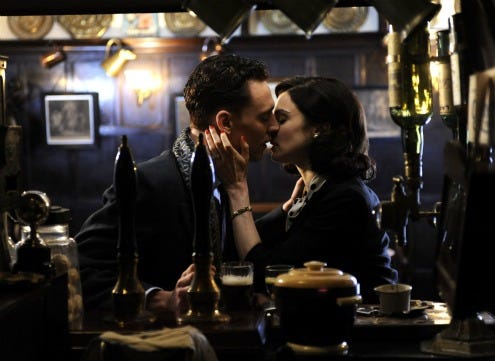The Deep Blue Sea

My opinion of "The Deep Blue Sea" is not dissimilar from that of the recent "Young Adult." Both are well-acted dramas about a female protagonist who is not a pleasant person with whom to spend time. What's more, she is totally unrelatable to the audience, doing silly and sometimes spiteful things for reasons I could not grasp.
Watching Hester Collyer (Rachel Weisz) dally between two men should be a compelling experience as we share her anguish over the painful choice she must make. Does she stay in a comfortable but loveless marriage with Sir William Collyer (Simon Russell Beale), a wealthy judge, or choose to be with the mercurial but passionate former RAF pilot Freddie Page (Tom Hiddleston)?
Instead, it's a dreary affair as Hester wavers and wonders, attempts a half-hearted suicide and runs this passive-aggressive campaign to make the callow Freddie commit to her. We don't feel sorry for her or identify with her but, at best, feel pity and, more likely, feel little.
It is possible to build a film around characters who are not supposed to be liked by the viewer — I think of Brenda Blethyn in "Secrets & Lies" — but the power in those characterizations lies in the ability to provoke a strong reaction from the audience. My strongest reaction to Hester is that I wanted her to go away.
It's never a good thing when your main character is the least interesting person onscreen.
Written and directed by Terence Davies, adapted from the play by Terence Rattigan, "The Deep Blue Sea" takes place over the course of a single day "around 1950." The story also shows flashbacks to earlier points in her relationships with the two men, but the transitions are so subtle that the film feels slightly unstuck from time, and we're never quite sure if what we're seeing is contemporaneous.
Plot-wise, there really isn't much to describe. Hester wakes up and tries to kill herself with a combination of pills and gas from the furnace but is saved by the helpful landlady (Ann Mitchell). Freddie, who must have slept in when they passed out empathy, is enraged when he learns of Hester's suicide attempt because he thinks it reflects badly on him.
William shows up from time to time to try to lure Hester into returning to him. He's quiet and diffident but smart enough to know his wife was unhappy. Whereas Freddie externalizes his discontent with Hester, she drives the shy William further into himself with her rejections.
William does have enough pride that he finds it hard to fathom why she would choose the penniless, irresponsible Freddie over himself. I don't understand why you would give up so much for so little, he tells her.
And that's Hester's quandary. She describes herself as "walking between the Devil and the deep blue sea," meaning she faces two terrible choices. She has genuine romance with Freddie, but he'll never love her like she does him, or she can be with William, who clearly adores her — a feeling she cannot return.
Perhaps it's because Hester knows what it's like to be emotionally rejected by the one she loves that she harbors pity for William.
If so, this could form the basis for a truly tortuous story about discarded love. What a shame "The Deep Blue Sea" is such a rudderless tale.
2.5 Yaps



